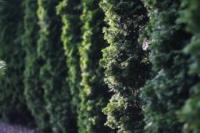 Add My Company
Add My Company
Sign In
Best Plants for Home Security
19-08-2021

Devising and establishing an effective home security strategy can be complex and costly. Many people immediately think about CCTV systems and other high tech security solutions, overlooking the fact that long before these were available various plants were commonly used to protect homes against intruders, keep predatory animals at bay and prevent livestock from straying. Many plants have developed robust, thorny, spiky defense mechanisms which make them formidable barriers so in this post we look at some examples of defensive plants you might want to consider for your garden.
Some might ask whether using plants provides effective home security. The answer is - yes it does. Perimeters protected by thick, prickly plants and shrubs are not easy to climb over and negotiating a garden, densely planted with skin-tearing thorny shrubs, can be almost impossible. Police forces throughout the UK recommend defensive planting which is known to act as a powerful anti-burglar deterrent.
Why Plants are Good for Home Security
Burglars tend to look for easy targets with no visible security. They know that most homes are poorly secured and likely to contain many valuables that can be quickly resold on the black market. These can include garden equipment, tools and other expensive items, such as bicycles, stored in outbuildings and sheds.
Defensive planting immediately deters opportunist thieves who would rather go for easier targets. Thorny, spiky plants present a formidable barrier which can’t be easily overcome without being injured and this isn`t something most burglars want to experience.
While a dense, prickly hedge might not appear to be as robust as a solid perimeter wall topped with anti-intruder spikes, the hedge can be far more difficult and time consuming to overcome. And if the hedge is just the first line of natural defense then the progress of any intruder will be seriously impeded.
Another important point to keep in mind when considering natural, plant based security is the cost. While it can take some time for hedging and shrubs to grow to the sizes required for defence the plants are very inexpensive. And importantly, defensive planting is not only great for home security it also looks wonderful and provides valuable natural habitats for wildlife.
How to Use Defensive Plants Around Your Property
When considering a natural home security strategy some planning is essential. As noted, plants can take some time to become established and grow to the sizes required for defence. Its also important to consider how big they are likely to grow and whether this will potentially be a problem. Hedging, for example, must generally be kept below 2 metres in height and if the hedge adjoins a road or public path then this maximum height is reduced to just 1 metre. If you want to grow a hedge higher than this you need to consult with your local authorities as planning permission may be required. Its also important to consider your neighbours and whether your defensive planting will affect them in any way.
Generally, you want to consider defensive plants which are thick, tall and wide. Although your front garden hedge height might be restricted to just 1 metre it could be impenetrably thick, dense and thorny.
When planning your planting its important to consider what’s strategically needed around your property. Police forces recommend supplementing existing garden fencing with prickly plants and shrubs to act as an additional anti intruder deterrent. They also recommend using appropriate planting under first floor windows and around drainpipes which might otherwise be used to access upper floor windows. Look for areas of weakness around your property and consider planting that will bolster security.
Another important consideration when planning your plant based home security strategy is not to introduce cover which might be exploited by burglars. High hedges can keep intruders out but they can sometimes provide burglars with the cover they need when breaking into a home.
Defensive planting is a very effective home security strategy but its essential to recognise that plants will continue to grow so ongoing maintenance is essential and handling these thorny, spiky plants can be dangerous. So its vitally important to wear protective eye goggles and thick gloves to prevent injury.
10 Best Plants for Effective Home Security
Its worth noting that there are actually many plants that have powerful defensive properties. We’ve selected a shortlist based on plants recommended by UK police forces and crime prevention specialists.
Pyracantha
Pyracantha, also known as Firethorn, is a dense, spiny evergreen shrub that makes a highly effected intruder proof hedge. Pyracantha flowers and berries are an excellent source of food for birds and insects so this hedge will attract wildlife to your garden.
Pyracantha is a hardy, fast growing plant (around 0.5 metres per year) that suits most soils and is easily maintained at between 1 and 3 metres in height. It needs full sun or partial shade but isn’t suitable for seaside locations, windy sites or dense shade.
Holly
English Holly is a well known, highly popular evergreen hedging plant that looks great all year round. Its dense growth and prickly foliage makes Holly ideal for anti intruder defense. During the winter Holly provides shelter for many native birds who feed on the attractive Holly berries.
Its worth noting that English Holly is slow growing, gaining around 10 to 15 cm per year. It prefers full or partial shade along with moist soil and is suitable for seaside locations and exposed gardens.
Mahonia
Mahonia is a hardy evergreen shrub with sharp, spiny leaves which are sharp enough to penetrate leather. It can grow to a height of 3 metres with a wide diameter of around 3 metres and can be readily shaped and maintained as a hedge.
Mahonia likes a fertile, moist but well drained soil and is frost hardy down to -5 degrees centigrade.
Rose
There are many varieties of rose, most of which have sharp thorns which make them effective barrier plants. While some varieties of rose, such as Dog Rose and Pink Ramanus Rose, will develop into dense, prickly hedges, many are more suitable for screening.
Some climbing Rose varieties provide excellent security when grown up drainpipes and on trellis. Rose flowers are particularly attractive and fragrant varieties can enhance a garden.
Gorse
Gorse is a native, evergreen plant that’s notoriously prickly. Its not a fast growing plant, extending by around 15 - 30 cm per year, but it can reach heights up to around 2.5 metres and is widely recommended as intruder-proof hedging.
Gorse is highly favoured as a hedging plant as it can adapt to a wide variety of soil conditions, but it must be well drained. Its suitable for windy, exposed coastal locations and has an extremely long flowering season from early spring until mid summer.
Berberis
There are many varieties of Berberis including Berberis Julianae which is evergreen and has long, strong thorns, making it ideal for anti intruder applications. Other Berberis varieties commonly used for hedging include: Purple Berberis, Barberry Rose Glow, Japanese Barberry, Red Barberry and Darwin’s Barberry.
Blackberry
Common throughout the UK, dense blackberry bushes provide excellent anti intruder defense. While they aren’t the most attractive plants in the garden Blackberry grows very fast, can reach almost 2 metres in height and is packed with sharp thorns making it very difficult to penetrate.
While Blackberry bushes will grow in light shade they tend to produce more fruit in sunny but sheltered locations.
Hawthorn
Hawthorn is a popular hedging plant that’s native to the UK and commonly used in countryside hedges. When it loses its foliage in Autumn the bare branches retain their sharp thorns which makes it an ideal intruder proof hedge.
Hawthorns like a well drained soil with plenty of organic matter but they are not too fussy about location or the type of soil. Hawthorn is widely appreciated for the abundance of wildlife it supports including as many as 150 species of insects and a variety of native birds.
Blackthorn
Blackthorn is often used alongside Hawthorn in native British hedging. It grows a little more slowly than Hawthorn but has the nastiest thorns of the two. Blackthorn can grow around 40 - 60 cm per year and does well in most soil types.
Euphorbia
There are many varieties of Euphorbia including the well known Christmas poinsettia. The larger, hardy, shrubby varieties are those which make excellent defensive plants in the garden. They are extremely thorny plants and the sap produced is another form of defence as it causes irritation to the skin and can result in sickness if ingested.
Additional Home Security Recommendations
It should be noted that, when planning an effective home security strategy, defensive planting is only one of the effective tactics that should be considered. Police forces and security professionals make the following additional recommendations.
Install outdoor security lighting, triggered by movement and / or photoelectric light sensitive switches which turn the lights on at night.
If you have valuable or unusual garden ornaments, sculptures or artwork keep a record by taking photographs.
Consider using gravel for paths and driveways as this prevents people from moving around quietly and therefore acts as an intruder deterrent.
Security label all your valuables including power tools, garden equipment and bicycles.
Never leave ladders, or other tools that could be used to break into your home, outside.
Bolster the security of your garage, shed and outbuilding doors and windows.
Verify that your home insurance policy covers theft from your outbuildings and garden.
Always securely chain bicycles, motorcycles, mowers and other equipment to immovable anchor points inside your shed or garage.
Consider using non-aggressive anti climb measures, such as anti climb paint and Roller Barrier, to protect areas that can’t be defended with planting.
Don’t overlook the need for wheelie bin security.
Get involved with a neighbourhood watch scheme.
If you have any questions regarding property and home security remember that we are here to help. Give us a call on 01273 475500 and we’ll provide you with free, expert advice.
For more information on Best Plants for Home Security talk to Insight Security
Enquire Now
List your company on FindTheNeedle.

